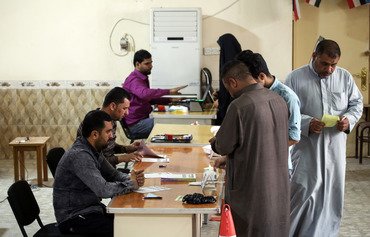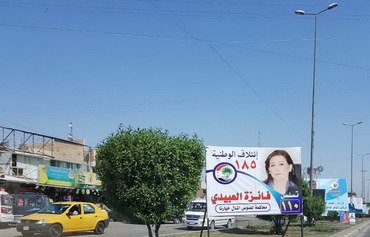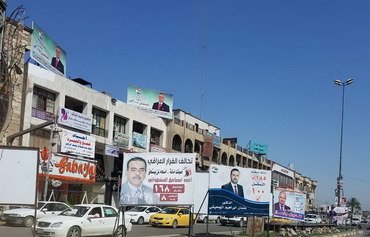Iraqi voters tell Diyaruna they hope the upcoming parliamentary elections, set for May 12th, will usher in real change, particularly with regard to improved public services.
A total of 7,367 candidates are competing for 329 seats in parliament.
They are presenting political platforms that focus on fighting corruption, improving government performance across service sectors, rebuilding infrastructure in areas liberated from the "Islamic State of Iraq and Syria" (ISIS) and compensating the group's victims, among others.
"Pictures of candidates are popping up everywhere," Ramadi-born taxi driver Ahmed Sabri, 51, told Diyaruna. "All we ask of them is to improve public services and look after the poor."
![An Iraqi employee at the Independent High Electoral Commission's office explains the voting process to a group of women. [Photo courtesy of the IHEC office in Salaheddine]](/cnmi_di/images/2018/05/02/12325-Iraq-elections-women-600_384.jpg)
An Iraqi employee at the Independent High Electoral Commission's office explains the voting process to a group of women. [Photo courtesy of the IHEC office in Salaheddine]
"Victory over terrorism has been achieved," he said, adding that the reconstruction of liberated cities and support of returning residents remains an issue, for which "elected politicians have to find radical solutions".
'Change is possible'
"Change is possible if voters carefully choose their representatives," said 21-year-old Baghdad University student Firas al-Shimmari.
Voters must make their choices carefully to ensure the candidate they select is "the most competent to run the country and can overcome challenges during the next stage", he told Diyaruna
Voting for the best candidate is important, homemaker Baydaa al-Fadhil agreed.
"All election campaigns are heavy on promises, but what is important is not the campaign promises per se, but whether the candidate can deliver," said the 34-year-old, who hails from Baghdad's al-Shurta neighbourhood.
"This is what we should be looking for."
"We have to look closely into every candidate’s curriculum vitae before making our decision," she told Diyaruna.
Hopes for the future
"We are hopeful that the upcoming elections will introduce a political class that is more capable of serving the people," Mahmoud Zeidan al-Obaidi, a candidate from the Arab Coalition party in Kirkuk province told Diyaruna.
A new crop of candidates and political alliances are presenting ambitious ideas and plans for development in the post-ISIS era, he said, that seek to steer Iraq towards stability and reconstruction.
Change is difficult but not impossible, he added, noting that "we have recently come out of a brutal war with terrorists and liberated our country, which motivates us to serve our country".
The sheer range of candidates and political alliances competing in the upcoming election will create a new political scene, said Almas Fadhil Agha, a candidate from the Patriotic Union of Kurdistan party.
This will serve the country’s interests, she told Diyaruna.
"There is a sense of disgruntlement among citizens regarding the general state of affairs", said Ahmed al-Asadi, a candidate for al-Fatah coalition.
This feeling is "justified", he told Diyaruna.
"We are responsible for motivating people to go out and vote, because it is the available democratic process for inducing change at the political, economic and service levels in our country," he said.
Al-Asadi said he hopes the elections will result in greater unity in Iraq, and that a newly formed government will work to implement reform programmes.

![An Iraqi citizen registers to vote at a polling station in Najaf province. [Photo courtesy of the Independent High Electoral Commission in Najaf]](/cnmi_di/images/2018/05/02/12324-Iraq-Najaf-station-600_384.jpg)






